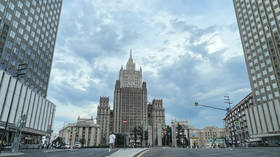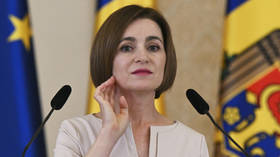Russia slams Moldova over ‘totalitarian censorship’ move

Moldova’s government is sticking to a policy of "eliminating any forms of dissent," the Russian Foreign Ministry said in a damning statement on Saturday. Moscow’s anger was provoked by Chisinau’s decision to terminate the media licenses of six Russian-language TV channels.
Chisinau is resorting to "totalitarian censorship methods to clear the national information space of all the last alternative viewpoint centers," Russian Foreign Ministry’s spokeswoman Maria Zakharova said, adding that the Moldovan government is "deliberately" depriving millions of Russian-speakers living in Moldova of the last remaining news sources in their preferred language. The decision would also leave "hundreds of journalists" without a job, she said.
Moscow "views this ban as an unprecedented act of political censorship, a violation of the principle of media pluralism and a gross violation of the right to free access to information," the Russian ministry’s statement said. Russia also considers it a "cynical violation of ethnic minority rights," since the move has "grave consequences" for Russian speakers in Moldova, it added.
On Friday, the Moldovan government’s Emergency Situation Committee revoked the licenses of Orhei TV, NV6, NTV Moldova, Accent TV, RTR Moldova and Primul in Moldova TV channels, accusing them of "inadequate interpretations" of events happening in Moldova as well as the ongoing conflict in Ukraine. The six channels now have to halt their broadcasts by December 19.
Moscow called on the "relevant international organizations" to give an "adequate assessment" of Chisinau’s actions and to take measures to remedy the situation.
The move taken by Chisinau came on the same day as the EU slapped Russia with a fresh batch of sanctions, the bloc's ninth raft of punitive measures. The newly introduced restrictions include the revocation of licenses for Russian media outlets including NTV, NTV Mir, Rossiya 1, REN TV and Perviy Channel.
Moldova, a former Soviet republic with a population of 2.6 million and a border with Ukraine, has recently seen massive protests against the government of President Maia Sandu. The country has taken an increasingly pro-EU course since Sandu came to power in 2020. Many people in Moldova have taken to the streets over the rising cost of living and energy prices, as well as other social and economic issues, aggravated by fallout from the conflict between Russia and Ukraine.













